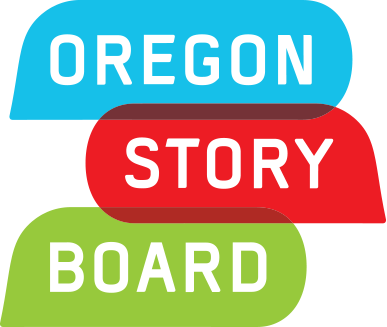FAQ: VR/MR 101 Beginner Classes
Q: Who is Oregon Story Board?
OSB is a 501(c)(3) nonprofit in Portland, Oregon committed to providing educational opportunity and workforce development pathways for the emerging virtual reality ecosystem.
As part of our mission to a thriving, accessible and diverse VR industry in Oregon, we have designed an educational curriculum to equip beginners and professionals alike with a comprehensive skill set for VR/MR development. The pathways explore User Experience Design, 3D Asset Creation, and Programming tools and skill sets used in the development of virtual and mixed reality applications.
Q: How do I determine which class is best for me?
Depending on your experience and interests, you can choose different approaches to our curriculum. You can align yourself with a topic (CG modeling, User Experience or Design, and Programming) you’d like to explore and develop expertise. Or, you can choose a discipline that is complimentary to your current knowledge, which will give you a greater perspective in the VR/MR development production process. Either way, you’ll be working with teams comprised of diverse VR enthusiasts from a variety of backgrounds.
Also, we would be more than happy to schedule a one-on-one consultation to determine which class would be the best fit.
Q: What will I actually learn in the classes?
Below is a breakdown of learning outcomes for each class:
UX101:
- List and define basic elements of UX design
- List and define VR/MR UX specific best practices
- Develop ideas and solve visual & sensory problems
- Discuss key aspects of a design or interface
- Contribute meaningful discussion to design reviews
- Respond to and evaluate user experiences using reasoned judgment
CG101:
- An introductory understanding of the history and future of VR/AR/MR technology and its potential use in a variety of industries.
- Familiarity of software applications needed to create content for VR/AR/MR environments, including but not limited to the Unity game engine and Maya.
- An introduction to asset creation – do’s, don’t and limitations.
- Familiarization of VR/MR hardware options, setup, and export.
DEV101:
- Use the Unity Game engine to create a VR & MR application
- Design around the constraints of VR & MR
- Communicate insights about VR & MR development (assumptions, alternatives, skepticism, scenarios)
- Gain an understanding of VR & MR programming techniques using C# and .NET frameworks
- Apply critical thinking and collaborate with a group to navigate challenges within VR & MR development
Q: Do I need to have any prior experience in programming to take the DEV101 class?
No. This class is designed to introduce individuals to the world of programming, specifically C# and Unity 3D interfaces. We will use an applied learning approach to concentrate on building programming competencies specifically used for Virtual & Mixed reality development.
Q: Why are there three (3) tracks for learning VR/MR development?
In 2016, Oregon Story Board & Clackamas Community College was awarded the Microsoft HoloLens Academic Grant. The grant proposal was based on utilizing HoloLens technology within trade-based education.
Based on findings from running three semesters of HoloLens creation classes, we refined our curriculum to focus on three core areas (UX, CG, and DEV) of the development process. Students can now enhance specific competencies prior to coming together as a team in the capstone courses.
If you’re interested in learning more, check out our white paper.
Q: Do you offer payment plans?
In general, we do not offer payment plans at this time. We are working hard to keep costs for classes low (similar courses in other states cost $2,500) and working with industry partners to procure scholarship funds. If you are an industry professional seeking to expand your knowledge, we recommend asking if your employer offers professional development funds or other continuing education assistance. If you think your company might be interested in providing scholarships, let us know!
If you are a student at the Art Institute, please contact anthony@oregonstoryboard.org for details about a special financial program specific to the Art Institute.
Q: Is there a demand for jobs in the VR/MR field?
Absolutely! Portland’s creative industry has embraced this emerging field, and continues to expand into new arenas such as medical, engineering, industrial and urban design, military, education, entertainment, and more.
Check out this VR/AR/MR ecosystem of Portland’s industry influencers in this emerging arena: Kudos to Paul Reynolds for creating this!
Q: Can I get college credit for taking these classes?
Depending on what college/university you attend; you may be able to showcase proficiency credit/skillsets that meet certain student learning outcomes. You will leave each class with portfolio projects that showcase competencies learned (i.e. projects deployed for HoloLens and Oculus). We can provide you with a syllabus and instructor credentials upon your school’s request. However, final determination is up to the college administration.
Q: What qualifications do your teachers have?
Our instructors are credentialed, industry professionals, who have developed VR experiences, taught college level courses, and have supported our local VR ecosystem.
Q: How large are the classes?
We want to make sure students receive an appropriate amount of attention when learning new skills in VR & MR, so we have capped the classes at 16 students.
Q: Are you an accredited institution?
No, we are not an accredited institution. We are a nonprofit organization who partners with educators and VR industry professionals to provide engaging, up-to-date, relevant curriculum that will be regularly updated to keep up with the ever-evolving nature of this new technology.
Q: What is your acceptance rate?
Our open enrollment courses are open for anyone to join.
